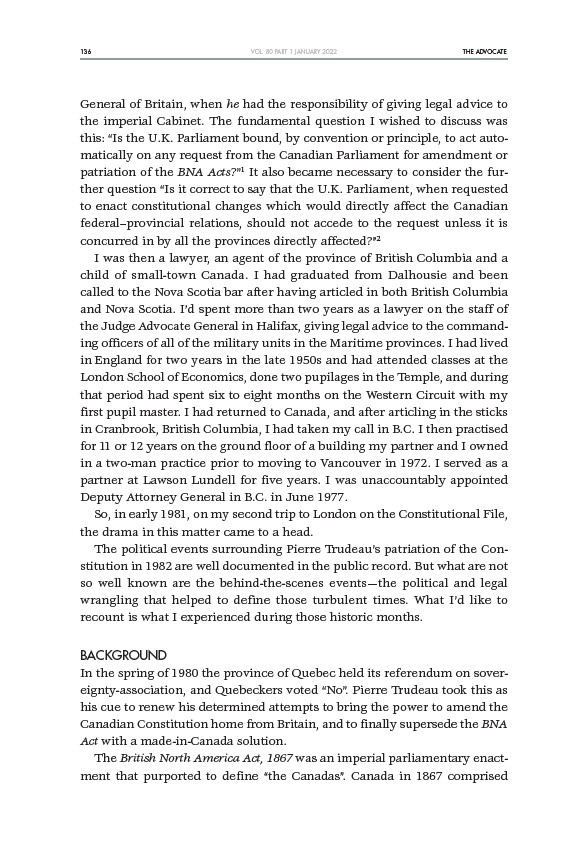
136 THE ADVOCATE
VOL. 80 PART 1 JANUARY 2022
General of Britain, when he had the responsibility of giving legal advice to
the imperial Cabinet. The fundamental question I wished to discuss was
this: “Is the U.K. Parliament bound, by convention or principle, to act automatically
on any request from the Canadian Parliament for amendment or
patriation of the BNA Acts?”1 It also became necessary to consider the further
question “Is it correct to say that the U.K. Parliament, when requested
to enact constitutional changes which would directly affect the Canadian
federal–provincial relations, should not accede to the request unless it is
concurred in by all the provinces directly affected?”2
I was then a lawyer, an agent of the province of British Columbia and a
child of small-town Canada. I had graduated from Dalhousie and been
called to the Nova Scotia bar after having articled in both British Columbia
and Nova Scotia. I’d spent more than two years as a lawyer on the staff of
the Judge Advocate General in Halifax, giving legal advice to the commanding
officers of all of the military units in the Maritime provinces. I had lived
in England for two years in the late 1950s and had attended classes at the
London School of Economics, done two pupilages in the Temple, and during
that period had spent six to eight months on the Western Circuit with my
first pupil master. I had returned to Canada, and after articling in the sticks
in Cranbrook, British Columbia, I had taken my call in B.C. I then practised
for 11 or 12 years on the ground floor of a building my partner and I owned
in a two-man practice prior to moving to Vancouver in 1972. I served as a
partner at Lawson Lundell for five years. I was unaccountably appointed
Deputy Attorney General in B.C. in June 1977.
So, in early 1981, on my second trip to London on the Constitutional File,
the drama in this matter came to a head.
The political events surrounding Pierre Trudeau’s patriation of the Constitution
in 1982 are well documented in the public record. But what are not
so well known are the behind-the-scenes events—the political and legal
wrangling that helped to define those turbulent times. What I’d like to
recount is what I experienced during those historic months.
BACKGROUND
In the spring of 1980 the province of Quebec held its referendum on sovereignty
association, and Quebeckers voted “No”. Pierre Trudeau took this as
his cue to renew his determined attempts to bring the power to amend the
Canadian Constitution home from Britain, and to finally supersede the BNA
Act with a made-in-Canada solution.
The British North America Act, 1867 was an imperial parliamentary enactment
that purported to define “the Canadas”. Canada in 1867 comprised